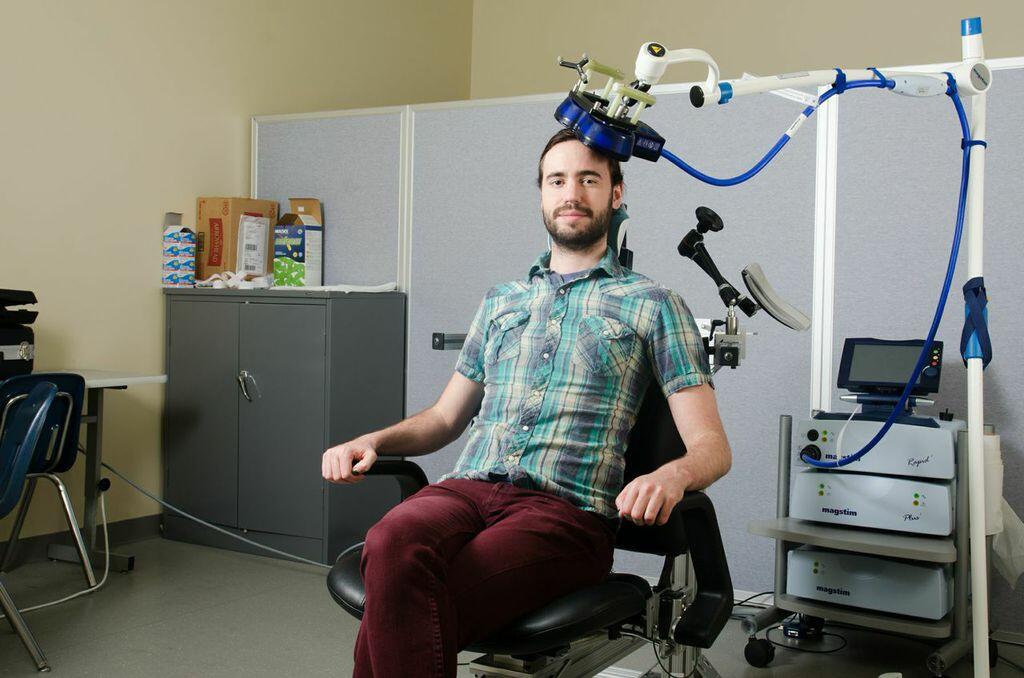The Non-Invasive Brain Stimulation Facility (NIBSF) has equipment and accessories for transcranial magnetic stimulation (TMS). There are two shared TMS devices, the first is a MagPro X100 with a Cool-B70 coil which is manufactured by MagVenture. The second system is a Magstim Rapid² with a D70mm Air Film coil manufactured by Magstim. Both these devices can produce single pulses or repetitive pulse protocols used to manipulate cortical plasticity. There is also a Brainsight neuronavigation system 2.2 used to individualize TMS target location based on the subject’s MRI image.
Certification:
If you plan on including TMS in your fMRI study then you must first obtain TMS user certification. The following procedure outlines the steps necessary for becoming a certified TMS operator at the Brain Imaging Center.
First read the following articles and then contact Miguel (mperez1@berkeley.edu(link sends e-mail)) to take the TMS user quiz.
1. Rossi et al., Clinical Neurophysiology, 2021(link is external) regarding TMS safety
2. Green and Wassermann regarding TMS ethical guidelines(link is external)
3. Oberman et al. 2011 on Theta-burst safety(link is external)
Fill out the BIC TMS Certification Form(link is external). In order to complete the form you must: (1) Obtain adult CPR certification if required for your protocol*, which is offered through the Recreational Sports Facility(link is external) on campus; (2) Shadow an existing 3T TMS user for 10+ hours; (3) Be listed on an active TMS protocol and become familiar with stimulation protocol designs, and (4) Complete the required Collaborative Institutional Training Initiative (CITI(link is external))(link is external) training course.

Once you have passed the quiz and filled out the certification form, you will then be given access to book the TMS room for studies via our scheduling software, Calpendo(link is external), assuming you already have an account. If you do not have a Calpendo account, read through here. At this time, using the TMS facility is free of charge, though the Brain Imaging Center reserves the right to change this policy at any time.
NOTICE! If you ever experience complications with one of your subjects while using the TMS hardware you must report the incident to the PI of the study, the IRB and the BIC directors.
* CPR training is not needed unless CPHS has required it for your specific TMS protocol. If it has been required for a specific protocol then it is the responsibility of the principal investigator to be certain that their researchers are appropriately CPR trained. If you are not the principal investigator and you are uncertain whether CPR training is required then please check with the PI of the project to be sure that you are meeting the protocol's CPHS requirements. As part of your BIC TMS certification, you must include the name of the protocol's PI on the certification form. BIC staff will then contact them to confirm that either CPR certification is not required for your protocol or that you have received appropriate CPR training if it is required. If you are uncertain whether a particular CPR course fulfills the CPHS requirements for your protocol then please contact the PI or Rebecca Armstrong at rda@berkeley.edu.
Magstim coils and their current locations:
2nd generation double 70 mm: Berkeley Way West 2128
Double 70 mm cooled coil system: Berkeley Way West 2128
Double 70 mm cooled coil system: Li Ka-Shing Center B100H
Air firm coil: Li Ka-Shing Center B100H
TMS rigs and their current locations:
Magstim Rapid²(link is external): Berkeley Way West 2128
Magstim BiStim²(link is external): Berkeley Way West 2128
MagPro X100(link is external): Li Ka-Shing Center B100E
Polaris cameras and Brainsight systems and their current locations:
Polaris camera with Brainsight 1.0: Berkeley Way West 2128
Polaris Spectra with Brainsight 2.2: Li Ka-Shing Center B100H
MagPro coils and their current location:
MRI-compatible MRi-B91 Coil: Li Ka-Shing Center B100E
